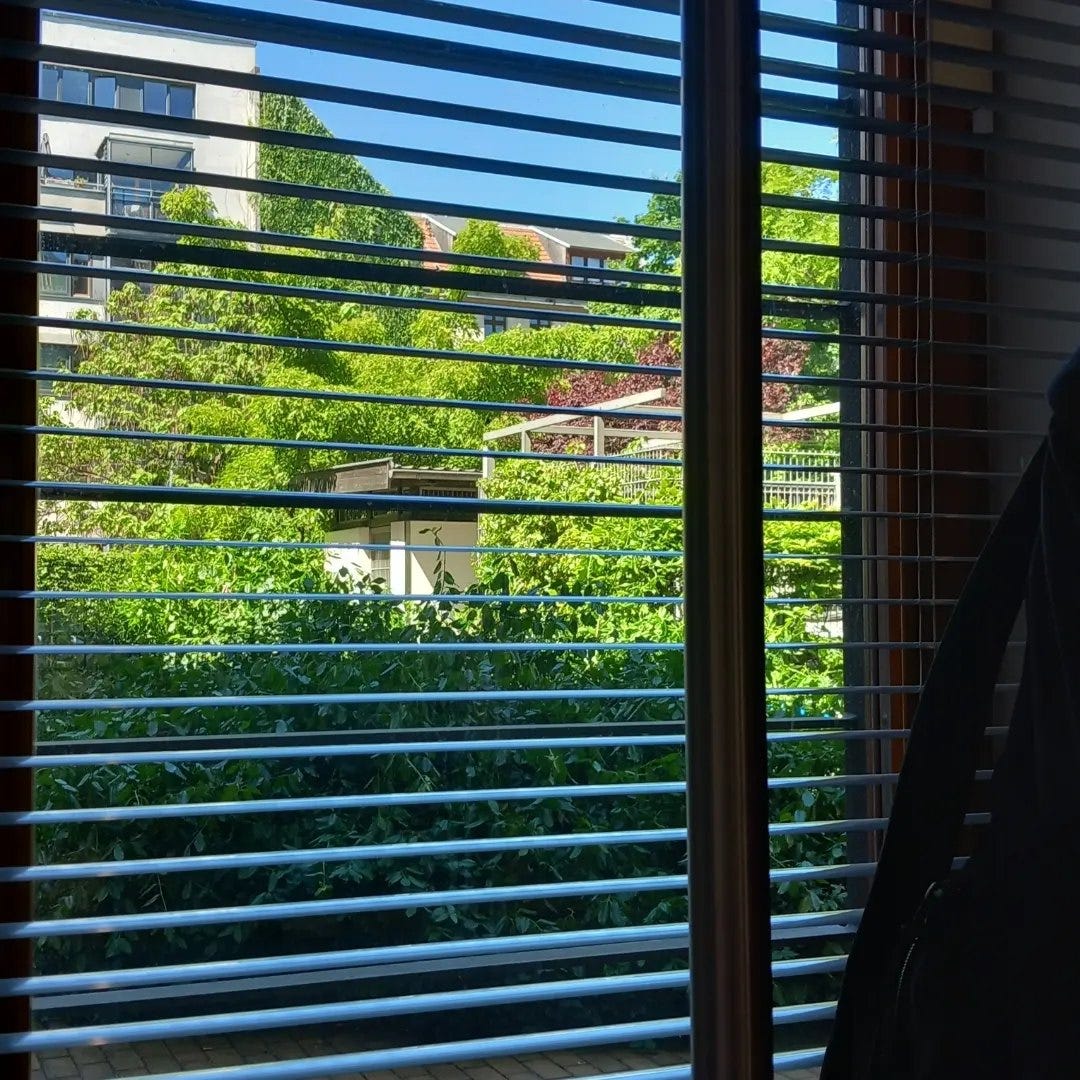repeated sound
Music for 18 Musicians sounds like warm, dry rain. The drops pelt you gently, but you don’t get cold or wet. And you see them bouncing on the grey streets, like tiny rubber balls.
Music for 18 Musicians sounds like taking the train. The overground. Watching the sun shine on pretty grey buildings as you go from one end of the city to the other.
And then you close your eyes, open them again, and everything’s softly blurred.
When it comes to music, I love repetition. (When it comes to reality, my feelings are more mixed, but that’s for another post.) One of the reasons I’ve never gotten into classical music is because it starts off with something simple, but then leaves simplicity behind, going off into too many directions. (The other reason is because its use of acoustic, traditional instruments makes me physically uncomfortable.)
Not that I’m completely against music going off in many directions. Sometimes I love it. Depends on the track.
I think Steve Reich’s music could be a good way of getting someone into techno, etc. Listening to its repetition might help them appreciate repetition in other genres.
I love techno. I love house. I love garage. I love hip-hop. I love their warmth, their cold, their mood, their subtlety, their clarity, their repetition. It always makes me sad when I hear people dismiss these kinds of sounds.
Repetition in electronica makes me picture the everyday motions of a city. Traffic lights and traffic, doors and windows, machines and plants. And you’re standing still for a moment, listening.
Sampling is like finding a shiny glass shard, rolling it in your palm so the light reflects off it over and over.
There’s always variations in light and shadow. There’s always variations in the everyday city scenes. But they still repeat.
There’s an interview with Stockhausen where he shares his thoughts on contemporary electronica, and in doing so reveals his own limitations. Instead of seeing if he could learn from them, he closes his ears. To quote Nick James Scavo, “the composer couldn’t stand the sight of another human’s conception of a world.” These musicians are doing something he can’t, but he pretends it’s all beneath him.
Stockhausen listens to Robin Rimbaud, Plastikman, Aphex Twin and Daniel Pemberton, but because they don’t make music the way he would, he doesn’t like it. Stockhausen hears their repetition and dismisses it. He assumes that it must be a mistake. But it isn’t. It’s a feature, not a bug.
Stockhausen describes their sound as “someone who is stuttering all the time, and can’t get words out of his mouth.” I like the stuttering. I like that, instead of a million ideas at once, we get one or two thoughts, repeated. Maybe those thoughts are fractured or unformed, but doesn’t that make them prettier?
Contemporary electronica captures the feeling of wanting to commuicate, but not knowing how. I’m not good at talking, or even writing, so the idea that electronica can be used to express such abstract feelings in such a simple way is part of its appeal. I’m communicating what I can’t say with words, or trying to.
Why does he assume maximalism is inherently more challenging than minimalism? I think it takes a lot of skill to create a small number of pristine, staccato sounds and let them echo. When it comes to poetry or fiction, the writers who impress me the most are the ones who keep it simple. (Basho, Tarjei Vesaas, Banana Yoshimoto, Raymond Carver, etc.) They are the ones who can really innovate. And the same is true with music.
I wish I could make my work more simple. More repetitive.
Of Plastikman, he says, “I know that he wants to have a special effect in dancing bars, or wherever it is, on the public who like to dream away with such repetitions,” but why is dreaming away with repetition a bad thing? And what’s the problem with making music for night clubs? I don’t go to clubs, but I still love the idea of listening to something made for a specific place, even a place disconnected or distant from me.
Of Daniel Pemberton, he says, “I think he should give up this loop; it is too old-fashioned. Really.” Well, I love loops. And I don’t think a man who refers to night clubs as “dancing bars” can call anyone else old-fashioned. Stockhausen says, “[Pemberton] likes train rhythms, and I think when he comes to a soft spot, a quiet, his harmony sounds to my ears like ice cream harmony.” To me, these are positives, but Stockhausen calls them kitsch. Thing is, there’s plenty of kitsch in Stockhausen’s own work.
Even with Rimbaud, AKA Scanner, the producer Stockhausen is kindest to, he still can’t help but go back to his own hang-ups. He seems afraid to praise anything new, afraid to admit that these musicians are doing something he couldn’t.
Stockhausen is too theory-headed to enjoy repetition for what it is, focusing on numbers over feelings. Worse, he is too Stockhausen-headed. It all comes back to him, what he did, and what he wants others to do. He imagines that if these newer musicians just listened to his music then they’d instantly see the error of their ways. He claims that Aphex Twin would “immediately stop” and switch tracks if he heard Gesang Der Jünglinge. (For the record, Gesang Der Jünglinge is fantastic, but so is Selected Ambient Works 85-92.)
I don’t care how famous you are; this arrogance is unacceptable. Stockhausen acts like he has nothing to learn from anyone younger. For an experimental composer, that’s a terrible attitude.
It’s a shame, because I do love Stockhausen’s electronic music. It’s beautiful. It’s fun. It’s cathartic. It has inspired some of my own attempts at making music.
I have memories of people laughing at music like Stockhausen’s, dismissing it immediately because it didn’t fit with their idea of what music should be, or because it didn’t belong in their rigid theory. Instead of opening their ears, they rejected it. And that has always bothered me. So it’s sad to find Stockhausen doing a similar thing with music that he isn’t used to.
There’s a subtlety in repetition that Stockhausen seems to miss. As groundbreaking and otherworldly as his music can be, it doesn’t have the lasting impact of something more simple and repetitive.
Imagine if Stockhausen had been inspired by Scanner and the others, making something that combined his ideas with theirs. I’d love to hear that.
Sorry. Went off on a tangent.
Sometimes my thoughts go in loops. Sometimes it goes off in too many directions. Both have their downsides, but I think I prefer simple looping. Maybe loops in music can help my head from getting overheated with too many thoughts.
My own music relies a lot on loops. Maybe those loops are limiting, but are limitations so bad? I love hitting on a cute sound, then letting it roll like toilet paper.





